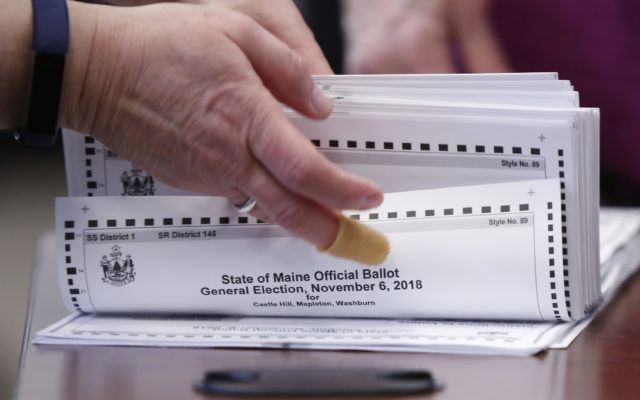
How ranked-choice voting will work in Maine’s Tuesday election
By Michael Shepherd, Bangor Daily News Staff
While a holiday will interrupt the process, a ranked-choice voting count in Maine’s 2nd Congressional District is expected to take just over a week to finish if no candidate emerges with a majority of first-place votes in Tuesday’s election.
The race between Democratic U.S. Rep. Jared Golden, Republican former U.S. Rep. Bruce Poliquin and independent Tiffany Bond will be one of the closest-watched U.S. House races in a conservative-leaning district that went twice for former President Donald Trump. It is likely to be the only major race in Maine decided by ranked-choice voting this year.
Here’s a refresher on how the system works and how the count is done.
How does ranked-choice voting work?
Ranked-choice voting, passed by Maine voters in a 2016 referendum, differs from traditional elections in which a candidate who gets a plurality of votes wins. In ranked-choice elections, voters can choose multiple candidates in order of their preference.
A winner is declared if a candidate wins an outright majority. But if no candidate gets more than 50 percent of total votes, the last-place finisher is eliminated and the second choices of their voters are then considered and reallocated to the remaining candidates.
In an election with a large field, this process repeats until a winner emerges with a majority of votes in a final round of voting. In the three-candidate 2nd District race, only one candidate will be eliminated and the winner will be decided after the reallocation.
It is also worth noting that the 1st Congressional District race between Democratic U.S. Rep. Chellie Pingree and Republican Ed Thelander also will have a ranked-choice ballot because Alan MacDonald of Wells is running as a declared write-in candidate.
Do you have to rank every candidate on the ballot?
No. If you rank just one candidate, your vote remains with them throughout the ranked-choice process. You are also allowed to rank your candidate first, second and third, but it is no different than ranking one candidate alone. The only way your vote is ever transferred to a second-choice candidate is if your first-choice candidate is eliminated.
There is no downside to ranking all the candidates. It ensures that your vote will never be “exhausted” — the term for a ballot that does not rank a continuing candidate. If that happens, your vote ends with your last-ranked candidate who was eliminated.
What mistakes can be made while ranking choices?
The secretary of state’s office has a handy guide on how to mark your ballot. There are a few things you should avoid because they either will or could void your vote.
Don’t rank two candidates first. That is an invalid “overvote” that leads to your vote getting thrown out because it is impossible to determine which candidate you favored.
Don’t skip more than two rankings. If you rank a first choice, skip rounds two and three and then mark a fourth choice, only your first choice will be counted. If you skip the first and second choice to rank a third and fourth choice, your ballot will not be counted.
Don’t skip the first choice. If you just rank a second choice, your municipality will record your vote as a blank in the first round of voting. If the race goes to a ranked-choice count, your second choice would be counted as your first choice. But don’t risk it.
How are ranked-choice voting results reported?
It is slower. The way you typically learn about the outcome of elections in Maine is through municipal clerks reporting unofficial results to media outlets that project outcomes. Those are confirmed when official results are tallied by the secretary of state’s office.
But in ranked-choice elections, those initial reports only include first-round choices. If it appears that no candidate in the 2nd District will win a majority, the secretary of state’s office will announce that a ranked-choice count will take place by the end of the week starting Nov. 14, said Emily Cook, a spokesperson for Secretary of State Shenna Bellows, a Democrat.
By the Wednesday or Thursday following the election, state police will begin collecting ballot information from cities and towns and transporting it to Augusta for the tabulation, Cook said. That process will be interrupted by Veterans Day, which falls on the Friday after the election, but it will resume afterward.
The ranked-choice count is a public proceeding and the winner is announced by the secretary of state at a live-streamed news conference that features a spreadsheet generated in real time before the media and candidates.